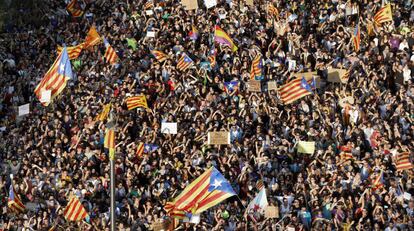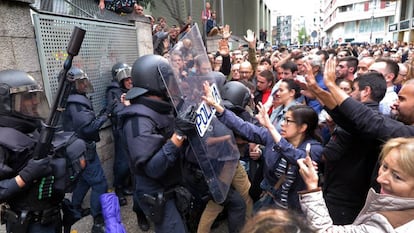Why Spain is right to defend its democracy in face of Catalonia crisis
The Spanish Constitution cannot be torn up by the illegal and seditious acts of a tiny minority, Dublin-based lawyer Isabel Foley argues

Events of recent days in Catalonia and the understandable reaction to the police intervention on October 1 have been tumultuous for Spain, a country now in crisis. There are many complicated issues at play. As a person with a deeply held Spanish heritage I am struggling with what is happening in a country I like to call my own and with the perception that exists as to what Spain is and as to the role of the Spanish authorities in all of this. So, here are a few thoughts that have been exercising me since Sunday October 1:
It is worth noting that the region of Catalonia has never existed as an independent political entity
1. Police violence and the idea of citizens being physically restrained from voting (and being injured) are abhorrent to all civilized people and Sunday’s scenes were deeply upsetting. The police intervention (and the manner of its execution) has also played into the hands of the Catalan separatists, allowing them to exploit the long shadow of dictatorship that has hung over Spain since Franco’s time, despite Spain having been a modern democracy now for nearly 40 years, and to portray the police intervention under a (center) right-wing government as more of the same. This is as disingenuous as it is fallacious. We know where nationalism often leads. However the police intervention cannot be allowed to dictate or distort the narrative. Nor should attempting to explain it be portrayed as apologist rhetoric. The reality of what is happening needs to be stated.
2. The Spanish Constitution is a democratic document negotiated in 1978 enshrining values, principles, and structures that are recognizable in most modern democracies. It was negotiated and written by the leaders of the seven political parties of the day, the center-right Union of the Democratic Centre (UCD), the right-wing People’s Alliance, the Socialist Party (PSOE), the Unified Socialist Party of Catalonia (PSUC) and the Democratic Pact for Catalonia (PDC, representing the Catalan nationalists). It was voted on and adopted by the Spanish people. Yes, as has been said recently in attempts to disparage it, its negotiators included right-wing leaders associated with former dictator Francisco Franco along with, of course, representatives from all political parties of that time (including Catalan nationalists): democrats who were intent on establishing the democracy they had dreamed of for so long.
The Spanish Constitution cannot be torn up by the illegal and seditious acts of a tiny minority of its people
It has served the democracy that Spain has been since 1978 pretty well. Spain’s executive, its legislature and its courts are a product of that Constitution (as are the autonomous structures under which Catalonia is currently governed). They are not offshoots of a dictatorship nor kangaroo courts nor courts imposing martial law, as has been portrayed.
3. The Spanish Constitution expressly prohibits secession. A referendum of part of its people cannot take place unless the Constitution is changed, by all of the people of Spain. The Irish Constitution does not prohibit secession, but I would hazard a guess that no interpretation of our Constitution would permit secession from the 26 counties (leaving aside altogether our own burning national question) without an amendment to the Constitution by a referendum of all of the people (not just of the part wishing to secede). It is not difficult to understand why Spain would resist the Catalan referendum, nor why the Spanish Courts declared it illegal, nor why both the Spanish and Catalan Courts issued orders prior to the referendum to stop it occurring. Indeed, an investigation is currently underway as to why orders of the Catalan Supreme Court to stop the referendum taking place were not properly complied with by the Mossos d'Esquadra, the Catalan regional police force.
How could a democracy operating under a hard-fought Constitution (after a dictatorship of 38 years) allow itself to be threatened in this way? No wonder the Spanish have railed against the assault on democratic principles that the referendum represented, and which the intention to declare independence represents. No wonder the anger and the fear is palpable.
Spain’s executive, its legislature and its courts are not offshoots of a dictatorship nor kangaroo courts nor courts imposing martial law
4. It is also worth emphasizing that it is under this Constitution that Catalonia secured its autonomy and its parliament, and it also gave regional premier Carlos Puigdemont his power. He now seeks to use it (and in the process disregard the Constitution and Catalonia’s own Estatut, which enshrined its autonomy) to declare independence, based on a mandate of a supposed 38% of the electorate (it has been reported that in 17 municipalities so far, the yes vote exceeded the registered electorate many times over).
Where is the respect for the democratic order? Where are the rights of the people both in Catalonia and the rest of Spain? Where is the respect for the rule of law? Where are the rights of the elected Catalan representatives in opposition whose parliament is to be dismantled if Puigdemont has his way? It sounds like a dictatorship to me.
5. Yes, there should be dialogue. Yes, urgent measures need to be taken to ensure that Spain does not become fragmented and divided. Yes, Spanish Prime Minister Mariano Rajoy (whose handling of this has been appalling and whose intransigence on the Catalan question for many years has been so counter-productive) and the leaders of all the political parties need to do something.
Yes, a country's Constitution is a living breathing document that needs to keep pace with changing times and be subject to change (if that is the will of the people) but it cannot be torn up by the illegal and seditious acts of a tiny minority of its people – a minority too of the people whom the Catalan separatists purport to represent.

6. Much has been made of the distinct Catalan identity, their language, and their right to self-determination. That may be so but we are not talking here about an oppressed people. Catalonia is one of the most prosperous regions of Spain and has one of the highest degrees of self-government in any region of Europe. It is also worth noting that the region of Catalonia has never existed as an independent political entity and was part of the original Kingdom of Aragon, which merged together with the Kingdom of Castille in 1492 to form the Spain we know today.
Much, too, has been said about the nationalism that Catalan separatism represents, an exclusionary, elitist and supremacist force that exercises significant controls over education and the media in the region. Much has been written about the dangers for Europe of the rising tide of nationalism, which is ever increasingly present. These are serious issues that must be discussed but the debate of recent days is a different one: are the actions of Spain (and Catalonia) to be viewed as those of a democratic country (and autonomous region) defending its Constitution, its legislative and judicial structures and its very survival as a democracy? Or are they to be viewed as those of a “dictatorship” protecting its own interests through the use of police force against innocent citizens? I think the answer is clear.
Isabel Foley is a lawyer based in Dublin.
Tu suscripción se está usando en otro dispositivo
¿Quieres añadir otro usuario a tu suscripción?
Si continúas leyendo en este dispositivo, no se podrá leer en el otro.
FlechaTu suscripción se está usando en otro dispositivo y solo puedes acceder a EL PAÍS desde un dispositivo a la vez.
Si quieres compartir tu cuenta, cambia tu suscripción a la modalidad Premium, así podrás añadir otro usuario. Cada uno accederá con su propia cuenta de email, lo que os permitirá personalizar vuestra experiencia en EL PAÍS.
¿Tienes una suscripción de empresa? Accede aquí para contratar más cuentas.
En el caso de no saber quién está usando tu cuenta, te recomendamos cambiar tu contraseña aquí.
Si decides continuar compartiendo tu cuenta, este mensaje se mostrará en tu dispositivo y en el de la otra persona que está usando tu cuenta de forma indefinida, afectando a tu experiencia de lectura. Puedes consultar aquí los términos y condiciones de la suscripción digital.








































